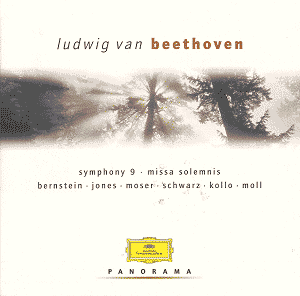 |
Ludwig van BEETHOVEN (1770-1827) Symphony no. 9 in D minor, op. 125 - "Choral" (1) Missa Solemnis, op. 123 (2) Live recordings, 1980 (1), 1979 (2) Crotchet AmazonUK AmazonUS Amazon recommendations |
Bernstein's image was always that of an individualist. This can be tracked from the days of the dashing young Yankee kick-starting old European orchestras into scintillating rhythmic displays up until the last decade when the white-haired sage, bowed by the troubles of the world and ill-health mainly of his own making, sought to find and impart spiritual values in a world singularly lacking in them. It was this sense of a personal crusade that made his performances events, often with an extra-musical meaning. When the Berlin Wall fell he was off to conduct Beethoven's Ninth among the ruins (not the performance we have here), notoriously exchanging "Freude" (joy) for "Freiheit" (freedom). At times it all seemed a little simplistic and one was reminded of Stravinsky's wicked summing-up of Pablo Casals's life's work ("he is against Franco, in favour of peace and believes in playing Bach in the style of Brahms") but usually his sincerity won the day. Like many great Americans, he lacked the typical European's fear of the obvious.
And yet the visual and political aspects of a Bernstein performance rather disguised the fact that, until the last decade, his interpretations of the classics were basically soundly read and uncontroversial. His desire to get things across to his public occasionally produced the odd overdone rallentando, but that was about it. The first movement of the Ninth is briskish, not a Toscanini lick but faster than we often hear today, and releases maelstroms of sound as the development reaches its peak. The scherzo is also fierce but not overdriven. The slow movement is only just on the right side of being a wallow. It is evidently the beauty of the music which appeals to Bernstein and the still, religious dimension that a Klemperer could find in it is not quite here. The finale builds up magnificently, the only drawback being Gwyneth Jones's wobbly, uncertain singing.
This work is effectively recorded. We are not told the recording venues, but the Missa Solemnis has a very long reverberation period and all the characteristics of a large cathedral - I was quite sure it was not recorded in the Concertgebouw yet Bernstein's official discography states that it was. The sound is muffled and confused, with close-miked soloists popping in and out. Whatever the problems of the hall, I should have thought a professionally-made recording from 1979 could have been better.
That said, the performance still makes a very powerful effect. In moments like the closing sections of the Gloria and the Credo Bernstein conducts like a man possessed, carrying all before him. Yet it is the Benedictus which he rightly makes the heart of the work. This is very much peace on earth, its message humanitarian rather than religious, yet it is mobile and mostly serene and genuinely moving. You can bet that Bernstein sees that the military irruptions in the Agnus Dei are adequately numbing and he handles the struggle back to peace with great mastery. Here, at least, his political programme coincided with Beethoven's own.
Three of the soloists are common to the performances but the soprano here is the excellent Edda Moser. Hanna Schwarz (does anyone ever remember the mezzo in the Ninth?) has some very impressive moments and it is a fine team overall.
These are performances for their time and of their time. Now the dust has fallen there may be others (both Toscanini and Klemperer in their different ways) who succeeded better at being timeless. All the same, the set represents extraordinary value for money. At a time when so many antiseptic versions are around, anyone snapping this up will get some of the greatest music ever written in performances which will leave them in no doubt that it is just that.
Christopher Howell.